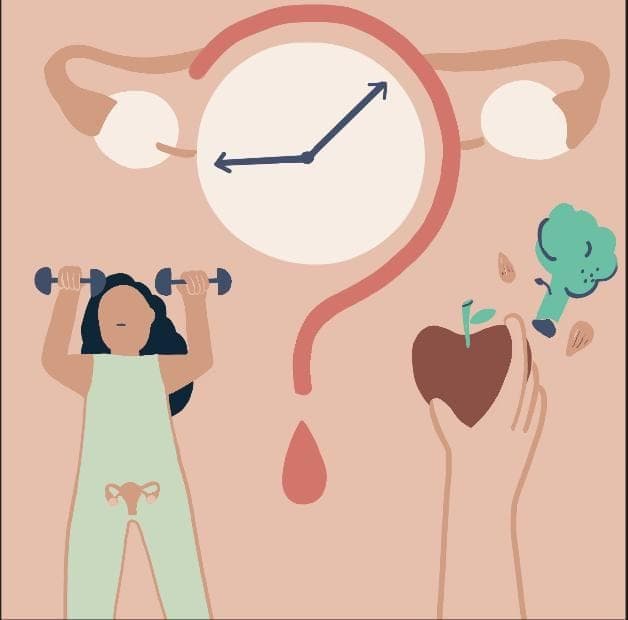Perimenopause Explained
Perimenopause lasts between 4 to 7 years and occurs before a woman reaches menopause. The perimenopause age differs for every woman and is predominantly dependent on genetics. The sudden drop of hormones during this period causes many changes in a woman’s body.
Symptoms
A few common perimenopause symptoms are:
- Irregular periods
- Bloating
- Hot flashes
- Flushing
- Insomnia
- Irritability
- Decreased concentration
- Memory los
- Anxiety
- Depression
Arthritis and osteoporosis are other common problems that occur due to declining estrogen levels in the body, especially if the woman is overweight or obese. The bones and joints start hurting; cholesterol levels are also affected.
Is It Reversible?
Today’s lifestyle is also one of the leading causes of problems like PCOS, endometriosis and fibroids that can also result in early menopause. Some habits like heavy smoking or drinking affect hormones and speed up your ageing process, causing premature or early menopause. Even though all of this may seem overwhelming, there are many ways to achieve a smoother and easier menopause transition, one of which is by managing your lifestyle and diet.
Read on to learn about the best diet for perimenopause, lifestyle changes to consider and more.
What lifestyle changes should you include?
Exercise : Exercising is undoubtedly one of the best ways to keep your health in check. Being physically active helps in maintaining your muscle and bone mass which is most important for women in their 40s. It will also be beneficial to retain a healthy weight and protect you from disorders like diabetes, hypertension and heart diseases.
The form of exercise does not matter; you must practice what you thoroughly enjoy doing. It can be a dance workout, aerobics, walking, running, yoga, weight training or bodyweight exercises.
Good Sleep : Getting enough, undisturbed sleep is one of the best perimenopause treatments as it will help in uplifting your moods and reducing stress levels.
Water : Increasing your water intake solves many problems like constipation, stress; it improves your energy levels and releases unwanted toxins and waste from the body.
What should you incorporate in your perimenopause diet and why?
A healthy diet during perimenopause is necessary for your body. If you are wondering which foods to eat during menopause, the answer is foods that are rich in nutrients like calcium, protein, omega3 fatty acids and fibre.
Calcium
The estrogen levels begin to fluctuate when you reach perimenopause. Estrogen is a hormone that is both cardioprotective and also helps in the healthy formation of bones. Increasing calcium intake will ensure minimal bone loss and a healthy heart. It will prevent you from issues like arthritis, osteoporosis and any heart-related diseases too. Similarly, Vitamin D is also crucial for good bone and muscle health.
Calcium-rich foods: Animal-based calcium sources include all dairy products like milk, cheese, paneer, etc. Plant-based calcium sources include dark green leafy vegetables, sesame seeds, ragi, amaranth or rajgira, soybean, soymilk, tofu, etc.
Tip: It is a common misconception that only milk and other dairy products provide calcium to the body. Factually, plant-based calcium sources have a much higher absorption in your body compared to animal-based calcium sources.
Protein
Your lean body mass starts decreasing during this period. It would require you to increase your protein intake as well. It is important to note that all our hormones are a combination of protein and fat. Deficiency in either of them will further cause issues as your hormone levels are already fluctuating at this stage. Protein intake will help in balancing and maintaining your hormone levels.
Protein-rich foods: Dals, sprouts, legumes, beans, organic chicken, organic fish, free-range eggs, etc.
Tip: Organic meat is much more beneficial than commercially bred hens and fish. Since the commercially bred ones do not get exposed to good quality of food, it affects the quality of meat too. Hence, it is always good to consume organic meat to gain nutrients.
Omega 3 fatty acids
Omega 3 fatty acids are known to be anti-inflammatory. Since ageing and dropping estrogen levels affect the heart too, it is crucial to include Omega 3 fatty acids in your diet as it lowers the risk of heart diseases. As the human body cannot make these healthy fats, you can get them through foods and supplements.
Omega 3 fatty acids rich foods: Ghee, unsaturated fats, processed meats, refined cooking oil; nuts like almonds, walnuts, cashew nuts, peanuts; seeds like flax seeds, sunflower seeds, sesame, pumpkin seeds, melon seeds, egg yolks, wild fish like pomfret, sardines, salmon.
Tip: Indian wild fish like pomfret, rawas (Indian salmon), bangda and rohu that are in deeper parts of the sea have more Omega 3 fatty acids than other fish.
Fibre
You must increase your fibre intake during perimenopause as it helps in maintaining a healthy weight. Fibre also reduces bloating that occurs due to hormonal changes. Furthermore, ageing weakens the digestive system and adding more fibre-rich foods to your diet will help with better digestion.
Fibre-rich foods: Fruits and vegetables will give you all the fibre and micro-nutrients that the body needs.
Tip: Unless you have any complications, you can eat all fruits and vegetables that are available in the market without thinking twice.
Along with physiological changes, you may experience mood swings too. In such times, bananas, almonds, walnuts, egg, chicken, turkey and dark chocolate are some foods that can help elevate the moods.
Using these dietary inputs, you can chalk out a perimenopause diet plan for yourself and curb your early menopause symptoms.
What should be avoided or stopped?
No specific foods need to be avoided or completely stopped. Some foods may suddenly stop suiting you. In such cases, they should be substituted with other foods so that your body still stays well nourished. Although mindful and healthy eating is supremely beneficial, we all cannot always curb our cravings. Therefore, it is important to practice portion control without going overboard.
However, stop consumption of smoking, recreational drugs and alcohol immediately.
How can you embrace these changes without any difficulties?
Even though the perimenopause treatment diet and exercise is needed, do not incorporate everything at once. You would not be able to sustain it for a very long time which will lead to further frustration. Slowly introduce the changes to your body without expecting overnight results.
Once you start following a healthier diet plan and lifestyle, you will observe good changes in your body; your hair and nail quality will improve, your weight will be in control, you will feel less bloated and will sleep well.
Bottom line
Menopause is a part of womanhood and is inevitable. If you eat a balanced diet with ample nutrition, you will manage the perimenopause period with fewer difficulties. You can even start incorporating these lifestyle and diet changes from your early 30s which will prove beneficial when you are approaching menopause and beyond.
Please be aware that this article is trying to create awareness about perimenopause. Contact your doctor if these symptoms are applicable to you.
Disclaimer: This article is for informational purposes only and should not be construed as a substitute for medical advice or treatment.
ProactiveForHer is a digital clinic for women, offering accessible, personalized, and confidential health-care solutions. We offer products and services for out-patient health concerns of Indian women, across their lifetime - from puberty to pregnancy to menopause.
To know more on the sexual and reproductive health of women, visit https://www.proactiveforher.com/

